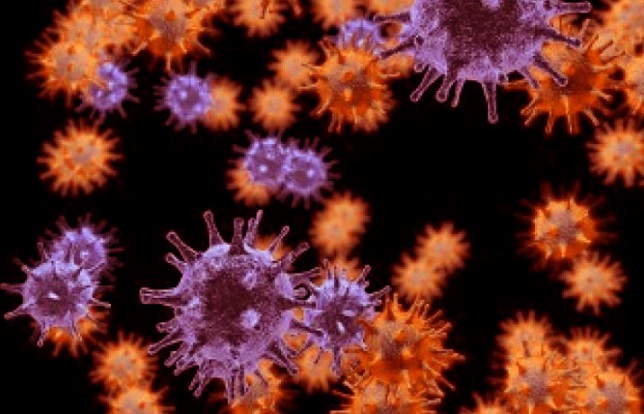High Risk of Hidden Viral Reactivations in COVID-19 Patients Adds New Layer of Danger
Nikhil Prasad Fact checked by:Thailand Medical News Team May 28, 2025 8 months, 2 weeks, 3 days, 5 hours ago
Medical News: Worrying discovery links common Herpesviruses to worse COVID-19 outcomes
A new study by Italian researchers has uncovered a serious and often-overlooked complication in COVID-19 patients—reactivation of latent herpesviruses that may significantly worsen the course of the disease. Scientists from the Laboratory of Microbiology and Virology at Maggiore della Carità Hospital in Novara, the Clinical Biochemistry Laboratory of AOU Città della Salute e della Scienza di Torino, Università del Piemonte Orientale, and several internal medicine departments in Alessandria and Cuneo have found that herpesvirus reactivation is far more common in COVID-19 patients and may lead to longer hospital stays, intensive care admissions, and more severe disease.
 High Risk of Hidden Viral Reactivations in COVID Patients Adds New Layer of Danger
High Risk of Hidden Viral Reactivations in COVID Patients Adds New Layer of Danger
In the comprehensive study involving 153 individuals, including 102 confirmed SARS-CoV-2-positive patients and 51 COVID-negative controls hospitalized with respiratory issues, researchers found that 76% of all participants had reactivation of at least one human herpesvirus (HHV), while nearly half (46%) experienced two or more reactivations. Notably, 83% of COVID-positive patients tested positive for at least one HHV, compared to only 61% of those without the virus. This
Medical News report highlights a critical gap in COVID-19 care—doctors may be missing the added risk posed by these dormant infections flaring back to life.
Which Viruses Are Waking Up—and Why It Matters
The most commonly reactivated virus was HHV-7, found in 57% of COVID-positive individuals. However, other concerning viruses such as cytomegalovirus (CMV), Epstein–Barr virus (EBV), HHV-6, and herpes simplex virus type 1 (HSV-1) were also far more likely to be reactivated in those with COVID-19. Not a single patient showed signs of reactivation of herpes simplex virus 2 (HSV-2) or varicella-zoster virus (VZV), but the combined effect of multiple HHV reactivations was clearly linked to poorer outcomes.
Among those with three or more viral reactivations, every single one was from the COVID-19 group. These patients were much more likely to require ventilatory support, be admitted to the ICU, and have significantly longer hospital stays. The worst cases even showed up to five simultaneous HHV reactivations—an indicator of catastrophic immune system failure.
How COVID-19 Fuels These Silent Viral Storms
Herpesviruses are known to lie dormant in the body and reactivate when the immune system is weakened. COVID-19, especially in its severe forms, triggers a profound disruption of immune responses—including lymphopenia (a drop in white blood cells), cytokine storms, and immunosuppressive treatments like corticosteroids—which creates the perfect conditions for these viruses to awaken. The study found that patients on steroid treatment were especially vulnerable to reactivations, particularly of HHV-6 and HHV-7.
In addition, high levels o
f inflammatory markers like interleukin-6 (IL-6) were linked to HHV reactivation, pointing to a vicious cycle: inflammation triggers viral reactivation, which in turn worsens inflammation and disease progression.
Cytomegalovirus and Multiple Reactivations Are Red Flags
CMV stood out as the only herpesvirus whose reactivation, on its own, was an independent predictor of severe COVID-19, extended hospitalization, and a greater need for ventilatory assistance. When three or more herpesviruses were reactivated, the risks multiplied significantly, with those patients being three to four times more likely to develop severe disease and remain hospitalized beyond 14 days.
Interestingly, although these reactivations were tied to more severe illness, they were not directly associated with increased 60-day mortality—except for EBV, which showed a significant correlation with higher death rates.
The Urgent Call for Change in COVID-19 Management
These findings raise an urgent need to rethink COVID-19 treatment protocols. Reactivated herpesviruses are not just background noise—they may play a critical role in amplifying disease severity. The authors urge clinicians to monitor herpesvirus activity in hospitalized COVID-19 patients, particularly those with moderate to severe illness. Antiviral drugs for viruses like HSV-1 and CMV are available and could be lifesaving if administered early.
Routine screening for HHV in COVID-19 patients—especially those receiving immunosuppressive therapy or with prolonged hospital stays—could provide doctors with crucial insights into patient prognosis and help reduce the risk of sudden deterioration.
Conclusion
This study sheds light on a hidden yet potentially deadly complication of COVID-19. The reactivation of herpesviruses—long thought to be dormant—can drive more severe illness, lengthier hospital stays, and the need for advanced respiratory support. The fact that CMV and multiple HHV reactivations act as independent predictors of poor outcomes should not be ignored. Moving forward, hospitals and clinicians must consider these findings when managing COVID-19 cases, especially those already at higher risk. Proactive herpesvirus monitoring and treatment could be the key to improving survival rates and patient recovery trajectories in this ongoing pandemic.
The study findings were published in the peer reviewed journal: Microorganisms.
https://www.mdpi.com/2076-2607/13/6/1221
For the latest COVID-19 News, keep on logging to Thailand
Medical News.
Read Also:
https://www.thailandmedical.news/news/can-sars-cov-2-reactivate-dormant-measles-virus
https://www.thailandmedical.news/news/serum-presepsin-as-a-key-indicator-of-herpes-simplex-virus-1-reactivation-in-covid-19-patients
https://www.thailandmedical.news/news/covid-19-makes-monocytes-dysfunctional-post-infection-raising-risk-of-opportunistic-infections-or-pathogen-reactivation
https://www.thailandmedical.news/articles/coronavirus
https://www.thailandmedical.news/pages/thailand_doctors_listings
